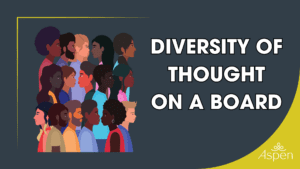POSTED Wednesday 06-11-24
Diversity of Thought on a Board
“Diversity” can be a polarising word, symbolising either a welcome shift away from the longstanding dominance of a specific demographic in positions of power or, for some, a label that unfairly prioritises surface-level traits like race, gender, sexuality, and class over individual merit and skills. However, it’s possible to break this old mould without reducing diversity to mere superficiality.
Rather than viewing diversity as a purely cosmetic adjustment, where board members are selected to ‘look diverse’ by fulfilling quotas, it’s essential to recognise the deeper value these identity categories bring in terms of distinct experiences, ideas, and outlooks. The gendered nature of our world often means that women, for instance, experience things differently from men, just as race can shape how people are treated in profound ways. These differences offer invaluable perspectives for any board aiming to bring fresh ideas to problem-solving, foster social justice, and build a more open and adaptable working environment. Far from political correctness, this ‘diversity of thought’ enhances a board’s capabilities and sensitivity to varied social realities.
Despite its benefits, diversity remains contentious, often dismissed as a “box-ticking exercise” designed to appease “woke” critics. In reality, however, a genuinely diverse board promotes a diversity of ideas, going beyond mere demographics or token gestures. For boards tasked with making complex, strategic decisions, a range of perspectives is crucial. This is especially true for organisations whose work affects specific communities. For example, a charity board addressing domestic abuse, where victims are predominantly women, would greatly benefit from the insights of women who understand the gendered dynamics at play. Similarly, board members from varied ethnic backgrounds can provide invaluable input on how their communities uniquely experience issues like domestic violence. This not only strengthens the charity’s mission but also brings career growth opportunities for board members who feel deeply connected to their work.
Some argue that if diverse groups (women, people of colour, etc.) truly bring such value, their low representation on boards suggests they lack interest or suitability. This view, however, ignores the systemic biases that often drive board selection. Boards tend to reflect existing biases, often favouring those who resemble previous or current leaders—typically white, middle-aged men. This homogeneity can unintentionally discourage diverse candidates, especially if they’ve previously faced discrimination. To counteract this, boards must consciously create a welcoming environment and actively seek out diverse voices. Without these efforts, candidates from underrepresented groups may fear, understandably, that their voices won’t be valued. Addressing this issue requires a commitment to dismantling longstanding biases, recognising that the playing field isn’t level. This isn’t about coddling but about creating supportive environments that fully harness the benefits of diverse perspectives.
An often-overlooked aspect of diversity is age, particularly the contributions of young trustees (generally aged 18–30). Labelling these members as ‘young trustees’ can seem to emphasise their age and lack of experience, yet their presence brings a unique and valuable perspective. For many, this may be their first significant role, and while they might initially require some guidance, they bring fresh ideas and a contagious energy. Their input can be particularly relevant if they share generational insights with service-users, adding another layer of diversity. Although young trustees may need additional support, the learning experience they gain is invaluable, resulting in a mutual benefit for boards, service-users, and the trustees themselves.
If you’re interested in joining a board—especially if you come from an underrepresented background—please reach out to Debbie Shields at dshields@aspenpeople.co.uk. Boards are eager to broaden their perspectives, and your experiences and insights could make a crucial difference.
